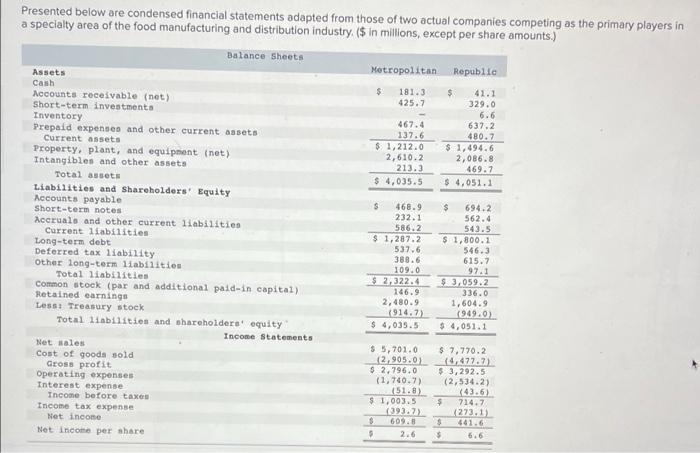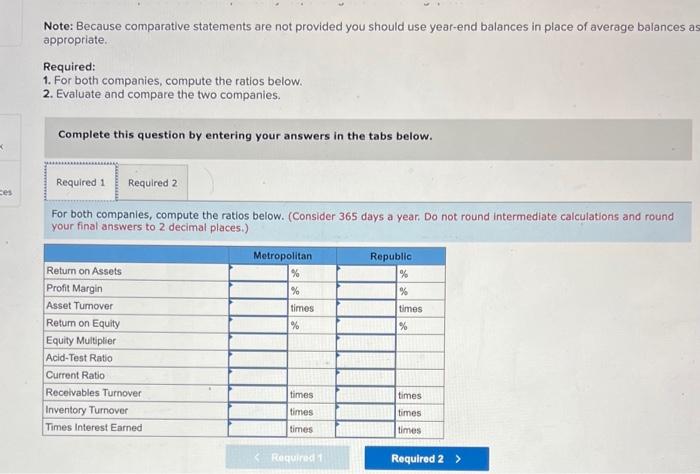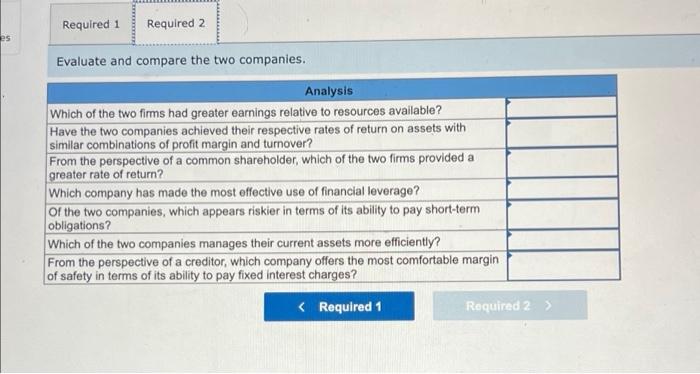Presented below are condensed financial statements adapted from those of two actual companies competing as the primary players in a specialty area of the food manufacturing and distribution industry ($ in millions, except per share amounts.) Balance Sheets Metropolitan Republic $ 181.3 425.7 467.4 137.6 $1,212.0 2,610.2 213.3 $ 4,035.5 $ 41.1 329.0 6.6 637.2 480.7 $ 1,494.6 2,086.8 469.7 $ 4,051.1 Assets Cash Accounts receivable (net) Short-term investments Inventory Prepaid expenses and other current assets Current assets Property, plant, and equipment (net) Intangibles and other assets Total assets Liabilities and Shareholders' Equity Accounts payable Short-term notes accruals and other current liabilities Current liabilities Long-term debt Deferred tax liability Other long-term liabilities Total liabilities Common stock (par and additional paid-in capital) Retained earnings Less Treasury stock Total liabilities and shareholders equity Income Statements Net sales Cost of goods sold Gross profit Operating expenses Interest expense Income before taxes Income tax expense Net income Net Income per share S 468.9 232.1 586.2 $ 1,287.2 537.6 388.6 109.0 $ 2,322.4 146.9 2,480.9 (914.7) $ 4,035.5 $ 694.2 562.4 543.5 $ 1,800.1 546.3 615.7 97.1 $ 3.059.2 336.0 1,604.9 (949.0) $4,051.1 $ 5,701.0 2,905.0) $ 2,796.0 (1,740.7) (51.8) $1.003.5 (393.2) $ 609.8 9 2.6 $ 7,770.2 (4,472.2) $ 3,292.5 (2,534.2) (43.6) $ 714.7 273.1) $ $ 6.6 Note: Because comparative statements are not provided you should use year-end balances in place of average balances as appropriate Required: 1. For both companies, compute the ratios below. 2. Evaluate and compare the two companies. Complete this question by entering your answers in the tabs below. Required 1 Required 2 For both companies, compute the ratios below. (Consider 365 days a year. Do not round Intermediate calculations and round your final answers to 2 decimal places.) Metropolitan % Republic % % % times times % % Return on Assets Profit Margin Asset Tumover Retum on Equity Equity Multiplier Acid-Test Ratio Current Ratio Receivables Turnover Inventory Turnover Times Interest Earned times times times times times times Required Required 2 > Required 1 Required 2 es Evaluate and compare the two companies. Analysis Which of the two firms had greater earnings relative to resources available? Have the two companies achieved their respective rates of return on assets with similar combinations of profit margin and turnover? From the perspective of a common shareholder, which of the two firms provided a greater rate of return? Which company has made the most effective use of financial leverage? of the two companies, which appears riskier in terms of its ability to pay short-term obligations? Which of the two companies manages their current assets more efficiently? From the perspective of a creditor, which company offers the most comfortable margin of safety in terms of its ability to pay fixed interest charges?









